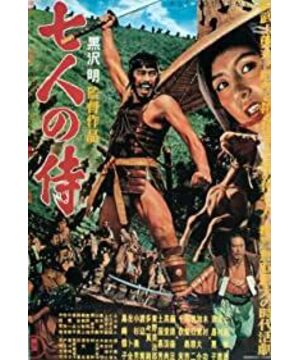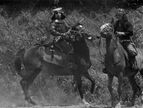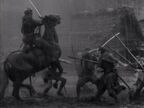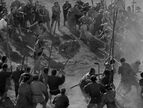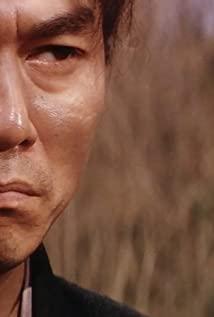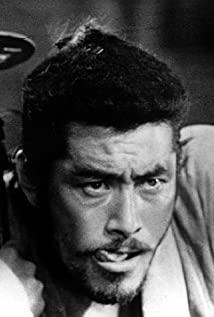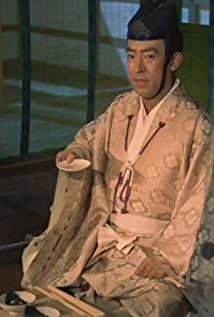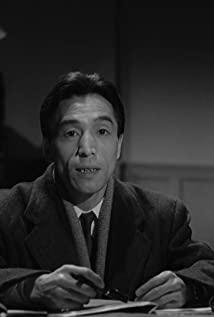The three-hour viewing experience, combined with some skip-the-slack filming, forced me to give this film four stars. But in the 1950s, it was possible to make such a movie, with moving plots, profound meanings, wonderful acting skills, and interspersed with various elements. It is no exaggeration to say that this film has successfully changed my perception and definition of the Japanese samurai.
In the eyes of many people, the Japanese samurai is a stubborn, traditional and mysterious existence. In addition to lying on their feet and holding a samurai sword, what they leave is cutting their abdomens and committing suicide. Of course, the influence of Japanese Bushido culture makes this phenomenon normal in Japan. But this film shows us all aspects of the samurai in addition to loyalty and honor.
The time background of the film is Japan's Warring States Period. At that time, Japanese villages were divided, and each village owner established himself as the king. In order to protect the territory, they cultivated Zhuang Ding, and this part of Zhuang Ding who knew martial arts became the later samurai. If a samurai finds a wealthy employer, he will be well-off. And if you can't find an employer, you will become a ronin, a samurai wandering the streets, that is, the down-and-out samurai mentioned in the film.
In a sense, several samurai in the film are active or passive ronin. Some were frustrated in the war and turned to wandering on the streets, some sought out martial arts on the streets, and some helped people work and get food on the streets. The story unfolds from these wandering warriors, which undoubtedly facilitates the shaping of the characters in the later period.
The image of the peasant class in the film is distinct, and the director also shows their vulgarity at a glance. In contrast, the warrior's bravery, resourcefulness, and composure are on display. In the film, you can see some satire on the Japanese peasant class at that time.
When it comes to this, such a character setting has to be reminiscent of the Japanese society at that time. In 1954, although Japan recovered from the war, it was strongly controlled by the Americans, and the failure of the stand was shrouded in every Japanese. But the strong oppression made it difficult for the Japanese to turn over. I wonder if director Hei Zeming made this film with the intention of encouraging the Japanese people to hold their heads up.
Closer to home, each of the seven warriors in the film is vivid. But running through the seven samurai is the word kindness. Take the most individual Kikuchiyo as an example. Although he is crazy, he was born a peasant and always wanted to be recognized. He hated war, and his identity as a peasant made him despise them for their cowardice and incompetence. There is sympathy, especially when he hugs the child whose parents have died, and shouts "This child is just like me!". Enough to show his kindness.
Unlike the samurai in our traditional concept, the samurai in the film are full of strategy, more like a conductor. The warriors in the film have strict discipline, do not kill prisoners, do not leave their posts without permission, obey orders, and get no prizes for robbing them. They are more like a well-trained army, and the leading bald warrior has perfect military tactics. Literacy. Historically, the Japanese court at that time was unable to suppress the riots, and the Japanese samurai acted as mercenaries. When Zheng Chenggong opposed the Qing and Fuming to borrow troops from Japan, although the shogunate refused, the samurai class actively requested to join the war. And in such an environment, the spirit of loyalty, honor, and good manners was formed. The two samurai in the film escaped from the army, and they have the perfect embodiment of the Bushido spirit except for the belly cut - brave and well-behaved, respectful and disciplined.
In addition to resisting demands, another theme permeated in the film is the impact on traditional thinking. The seven samurai are the main force of propaganda. On the positive side, the father of a woman disguised as a man is persuaded to accept her love affair with a samurai. On the other hand, the class difference between samurai and peasants is gradually broken by samurai in the film.
At the end of the film, the director left a question worth pondering: "It is not the samurai who won the battle, but the peasants." I think the director arranges the peasants in the opening film to invite the samurai, and the happy farming of the peasants at the end of the film is all about making the peasants the main body of the film. display. However, due to the difference between peasants and samurai in reality, the depiction of peasants unwittingly became a contrast to samurai. Besides, the title of the film is also called Seven Samurai. But from a spiritual point of view, this sentence also seems to make sense: "The peasants, through their own efforts and sacrifices, invited the samurai, and then united, changed their previous cowardice, and finally defeated the bandits. live a happy life.”
It has to be said that the cross-rendering of various atmospheres in the film is completely supported by the actors' acting skills without color and special effects. In the history of film, "Seven Samurai" is definitely a work of historical significance.
View more about Seven Samurai reviews


